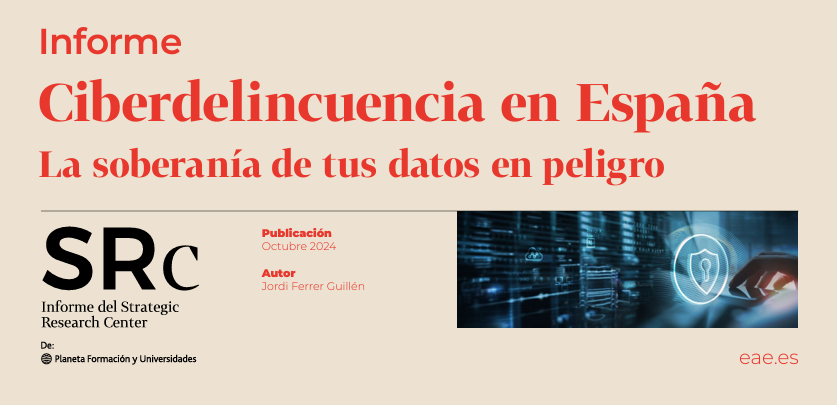
Millennials and Gen Z are the ones who suffer the most from online scams
In the midst of the boom in artificial intelligence and the massive use of technology in all kinds of products and services, 47.4% of Spaniards claim to have suffered a scam or attempted scam in the last year, according to the assessment made by EAE Business School, part of Planeta Formación y Universidades, in its latest report, entitled ‘Cybercrime in Spain. The sovereignty of your data at risk’.
The study, carried out by Professor Jordi Ferrer Guillén of EAE Business School, highlights the growing threat posed by cybercrime on a global and national level. In addition, the analysis also addresses the role of emerging technologies such as generative Artificial Intelligence and their involvement in cybercrime.
According to the assessment, online scams remain the most prevalent crime, with an exponential growth of 509.1% since 2016, in relation to data from the Sistema Estadístico de Criminalidad and the Ministerio del Interior. Meanwhile, in relation to the analysis, 60% of Spaniards recognise having ‘little or no’ knowledge about security and personal data protection online, which reinforces the need for education and awareness in cybersecurity.
‘New technologies such as artificial intelligence, which facilitate automation and behavioural learning, are being exploited to create threats that are increasingly personalised and difficult to detect,’ says the EAE Business School professor and cybersecurity expert. ‘It is essential that both companies and individuals strengthen their cybersecurity measures and keep up to date with new forms of attack,’ he adds.
Also, according to EAE's assessment, young people aged between 25 and 34 (Millennials and Gen Z) are the group most affected (61.3%) in terms of scams or attempted scams. ‘Their massive use of technology for study, work or leisure makes them more vulnerable. Especially Gen Z, which, being digital natives, consumes, informs and communicates using technology, social networks and AI’, explains Ferrer.
According to the Centro de Investigaciones Sociológicas (CIS), 93.7% of citizens are very concerned about the impact of Artificial Intelligence (AI), especially because of the growing difficulty of distinguishing between what is real and what is fake on the Internet.
In this sense, Spain is at a crossroads in terms of cybersecurity. Although Madrid and Barcelona account for almost 30% of reported cases, the impact of cybercrime is widespread throughout the country. The report highlights that, despite these data, only a minority of companies invest significantly in digital security measures.
Cybersecurity: a global challenge
Along the same lines, the assessment states that, in the first six months of 2024, 237,240 cases of cybercrime were recorded in Spain, representing an increase of 10% compared to the same period in 2023. This increase in cybercrime cases, which highlights the growing sophistication and frequency of cybercrime, includes computer scams, illegal access to systems and identity theft, among others.
The report highlights how the advancement of technology has been a catalyst for cybercrime. According to the National Cyber Security Index (NCSI) 2023, the top European countries in terms of cybersecurity are Belgium, Lithuania and Estonia, with Spain in 10th place. Furthermore, the Global Cybersecurity Index (GCI) 2024 places Spain among the Eurozone countries with the best cybersecurity systems, alongside leaders such as Estonia and the United Kingdom.
On the other hand, the use of Artificial Intelligence (AI) to boost cybercrime has increased significantly. The report mentions the growing sophistication of crimes such as phishing, mass phishing, voice impersonation for fraud and the creation of deepfakes, which poses new challenges for digital security.
Report recommendations
The study presents a series of recommendations to strengthen digital security in Spain, including the need to encourage investment in advanced cybersecurity technologies, such as Artificial Intelligence and blockchain, to combat fraud and other cybercrime; to promote awareness campaigns aimed at the general public on the importance of personal data protection; and to promote stricter regulation that forces companies to implement robust and auditable security protocols.

